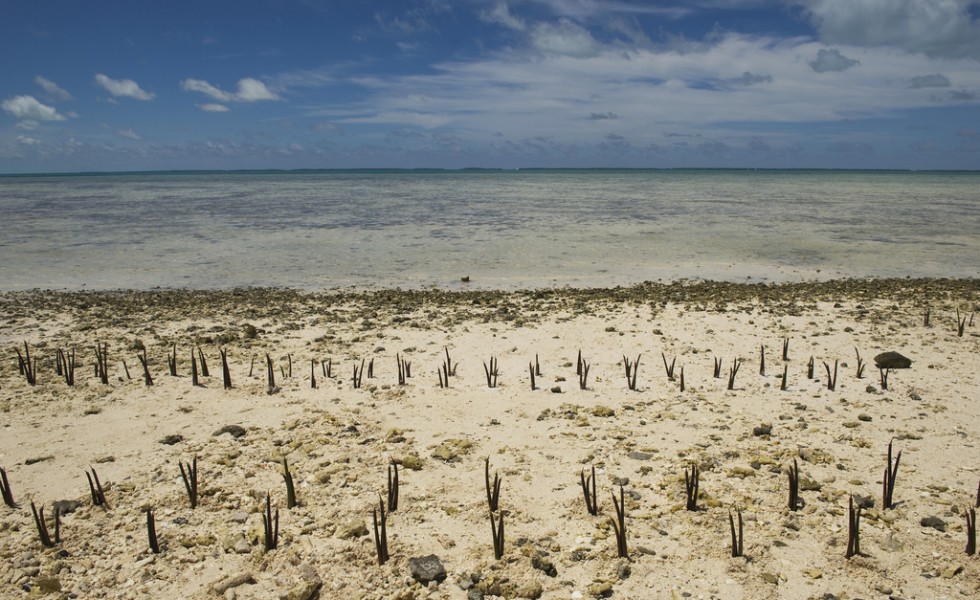A Cautionary Note from Sand County
Posted on October 31, 2018

“February” is one of the finest essays in Sand County Almanac, the 1949 book of superlative essays on nature and mankind’s role in it, by forester and conservationist Aldo Leopold. In it, Leopold, the father of wildlife ecology, tells the history of his Wisconsin “sand farm” and its natural “community” as he and a friend crosscut-saw through the story-holding rings of a still-standing, 80-year-old oak tree killed by lightning.
“It took only a dozen pulls of the saw to transect the few years of our ownership,” Leopold writes, before the saw “…began to cut the years of our predecessor the bootlegger, who hated this farm, skinned it of residual fertility…”
A few dozen more pulls and “We cut 1908, a dry year when the forests burned fiercely, and Wisconsin parted with its last cougar.”
As the pair’s saw bites deeper into the towering oak, Leopold’s prose bites deeper into man’s historical, even pathological, exploitation of the natural world surrounding it. Every stroke delivers both sawdust and examples of man’s misuse of either soil, water or wildlife.
“We cut 1899, when the last passenger pigeon collided with a charge of shot near Babcock, two counties to the north…” reads one. “On 10 September 1877, two brothers, shooting in Muskego Lake, bagged 210 blue-winged teal in one day,” reads another.
The tree-cutting allegory ends when “…all hands cry ‘Timber!’” and the mighty oak, like all trees and most civilizations before it, “…leans, groans, and crashes with earth-shaking thunder…”
Although Leopold died the year before that essay (and, in fact, Sand County Almanac) was published, his enduring words and lesson, like his saw, remain sharp two weeks after the United Nations released its equally sharp report by the Intergovernmental Panel on Climate Change (IPCC).
Unlike Leopold, however, the IPPC report is the saw, not the sawyer; it cuts through ring after ring—decades—of climate change deference and denial to deliver its lesson: The world has less than 15 years to slash carbon use before “even half a degree” of climbing temperatures “significantly worsen the risks of droughts, floods, extreme heat and poverty for hundreds of millions of people,” explains the Guardian on Oct. 8.
It’s even more bleak than that, notes the newspaper. “‘It’s a line in the sand and what it says to our species is that this is the moment and we must act now,’ said Debra Roberts, a co-chair of the [IPCC’s] working group on impacts.”
Will we act now?
Early reviews of the report, compiled by 91 scientists from 40 nations who cited more than 6,000 climate-related studies, suggest more denial, inaction, and delay. The White House openly dismissed it; Congress has no hearings scheduled to review it; and few farm and commodity groups even noted its publication.
That’s just dumb because no socio-economic group anywhere has been or will be affected more by climate change than the world’s farmers and ranchers. Climate is as key an element to their prosperity or failure as land and water, and nothing has more impact on either than the weather.
Just ask the ranchers of the Canadian Prairies stung by this year’s punishing drought, the Southeast U.S. farmers hammered by Hurricanes Florence and Michael, or the North and South Dakota farmers now sweeping October snow off their combines before going back to a soggy, muddy harvest.
It will get far worse and doing nothing, the UN report forecasts, will carry the unfathomable cost of “as much as $54 trillion” by 2040. For comparison, that’s nearly three times the size of today’s U.S. economy.
Now add two billion more people (the estimated growth in global population by 2050) and farming and ranching’s—mankind’s—future in today’s era of swift climate change looks as stark as Leopold’s lightening-struck, Sand County oak tree.
The biggest difference between his tree and ours is equally stark: his tree didn’t have a choice; we do.
© 2018 ag comm
Share This